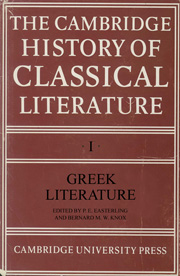Book contents
- Frontmatter
- 1 Books and readers in the Greek world
- 2 Homer
- 3 Hesiod
- 4 The epic tradition after Homer and Hesiod
- 5 Elegy and iambus
- 6 Archaic choral lyric
- 7 Monody
- 8 Choral lyric in the fifth century
- 9 Early Greek philosophy
- 10 Tragedy
- 11 The satyr play
- 12 Comedy
- 13 Historiography
- 14 Sophists and physicians of the Greek enlightenment
- 15 Plato and the Socratic work of Xenophon
- 16 Oratory
- 17 Aristotle
- 18 Hellenistic poetry
- 19 Post-Aristotelian philosophy
- 20 The literature of the Empire
- 21 Epilogue
- Appendix of authors and works
- Metrical appendix
- Works Cited in the Text
- References
18 - Hellenistic poetry
Published online by Cambridge University Press: 28 March 2008
- Frontmatter
- 1 Books and readers in the Greek world
- 2 Homer
- 3 Hesiod
- 4 The epic tradition after Homer and Hesiod
- 5 Elegy and iambus
- 6 Archaic choral lyric
- 7 Monody
- 8 Choral lyric in the fifth century
- 9 Early Greek philosophy
- 10 Tragedy
- 11 The satyr play
- 12 Comedy
- 13 Historiography
- 14 Sophists and physicians of the Greek enlightenment
- 15 Plato and the Socratic work of Xenophon
- 16 Oratory
- 17 Aristotle
- 18 Hellenistic poetry
- 19 Post-Aristotelian philosophy
- 20 The literature of the Empire
- 21 Epilogue
- Appendix of authors and works
- Metrical appendix
- Works Cited in the Text
- References
Summary
INTRODUCTION
The astounding growth of the Macedonian empire in the second half of the fourth century resulted in a fundamental political restructuring of the Greek world; it also promoted radical cultural changes which turned intellectual and artistic endeavour irreversibly in new directions. In the fifth century, and even in the fourth, Greek culture had been dominated by Athens: yet it was the new Egyptian city of Alexandria which, within little more than a generation after the death of Alexander the Great, became the unquestioned intellectual centre of the transformed Hellenic world. Greek Egypt achieved stability well before the other areas of Alexander's fractured empire, which were thrown into nearly half a century of turmoil by his untimely death, and Ptolemy Soter's rapid consolidation of governmental power both within Egypt and in crucial areas of the Aegean combined with Egypt's immense natural wealth to make Alexandria one of the most attractive cities of the Greek world. The new regime determined to build for themselves in Africa a way of life which was powerfully and essentially Greek, and huge quantities of money were poured into the construction of buildings, the establishment of Greek religious cults and festivals, and the support of almost every type of intellectual and cultural activity from scholarly and scientific research to contemporary art. To Alexandria in the fourth and early third centuries went most leading intellectuals, writers and scientists from all over the Greek world, and two hundred years later Andron of Alexandria could write:‘It was the Alexandrians who educated all the Greeks and barbarians when general culture was tending to disappear owing to the continuous disturbances in the age of the Successors to Alexander.’
- Type
- Chapter
- Information
- The Cambridge History of Classical Literature , pp. 541 - 621Publisher: Cambridge University PressPrint publication year: 1985
References
- 14
- Cited by

